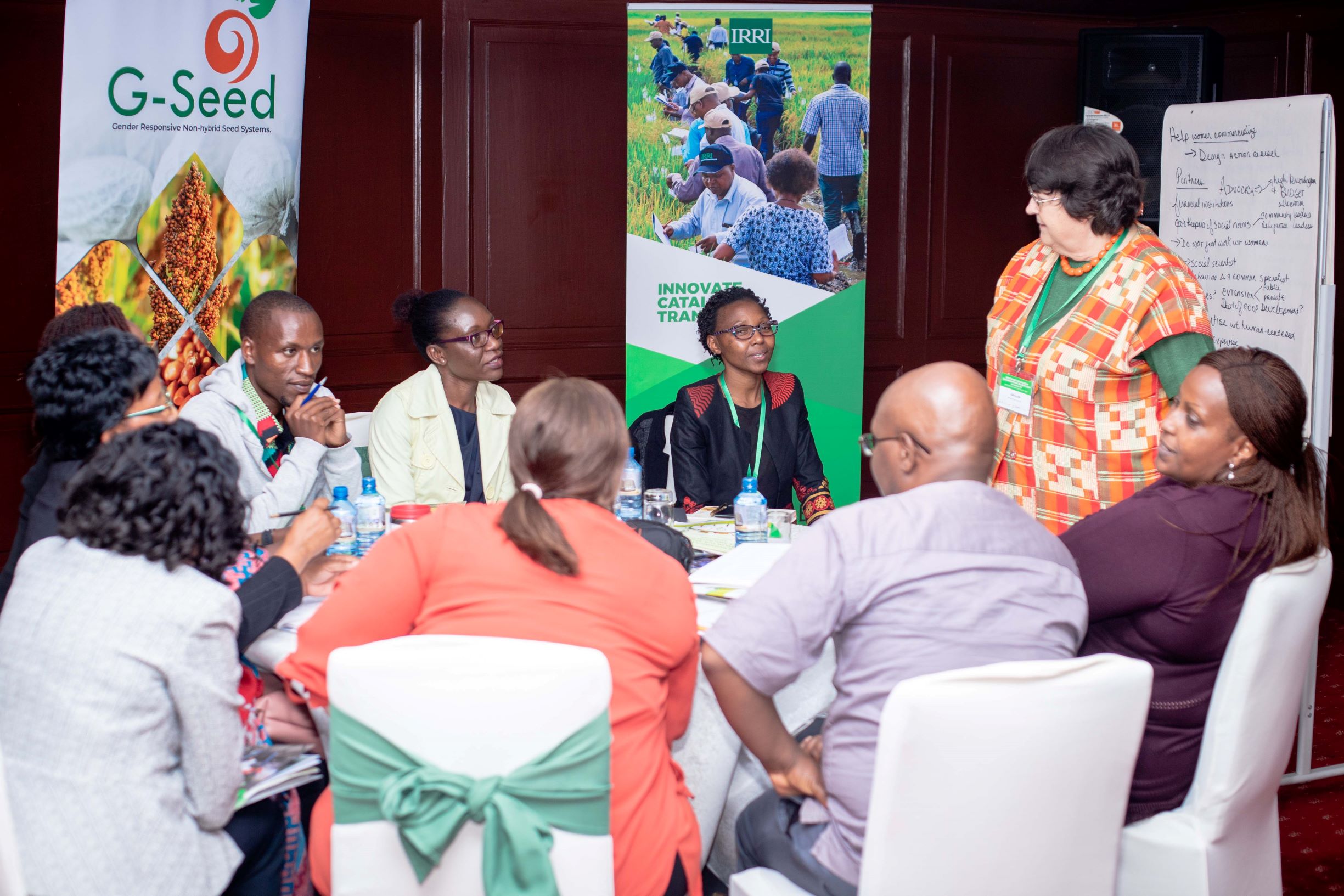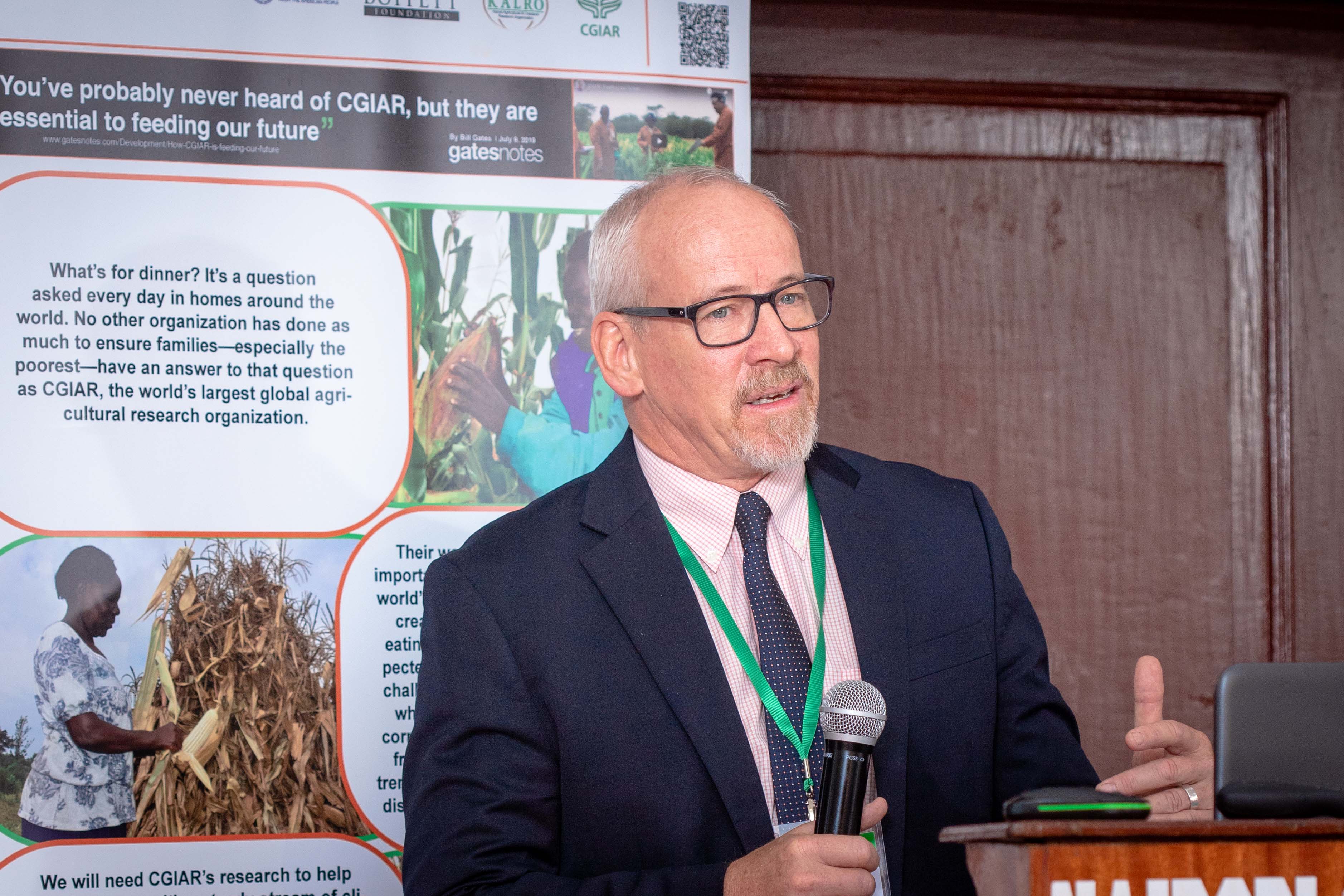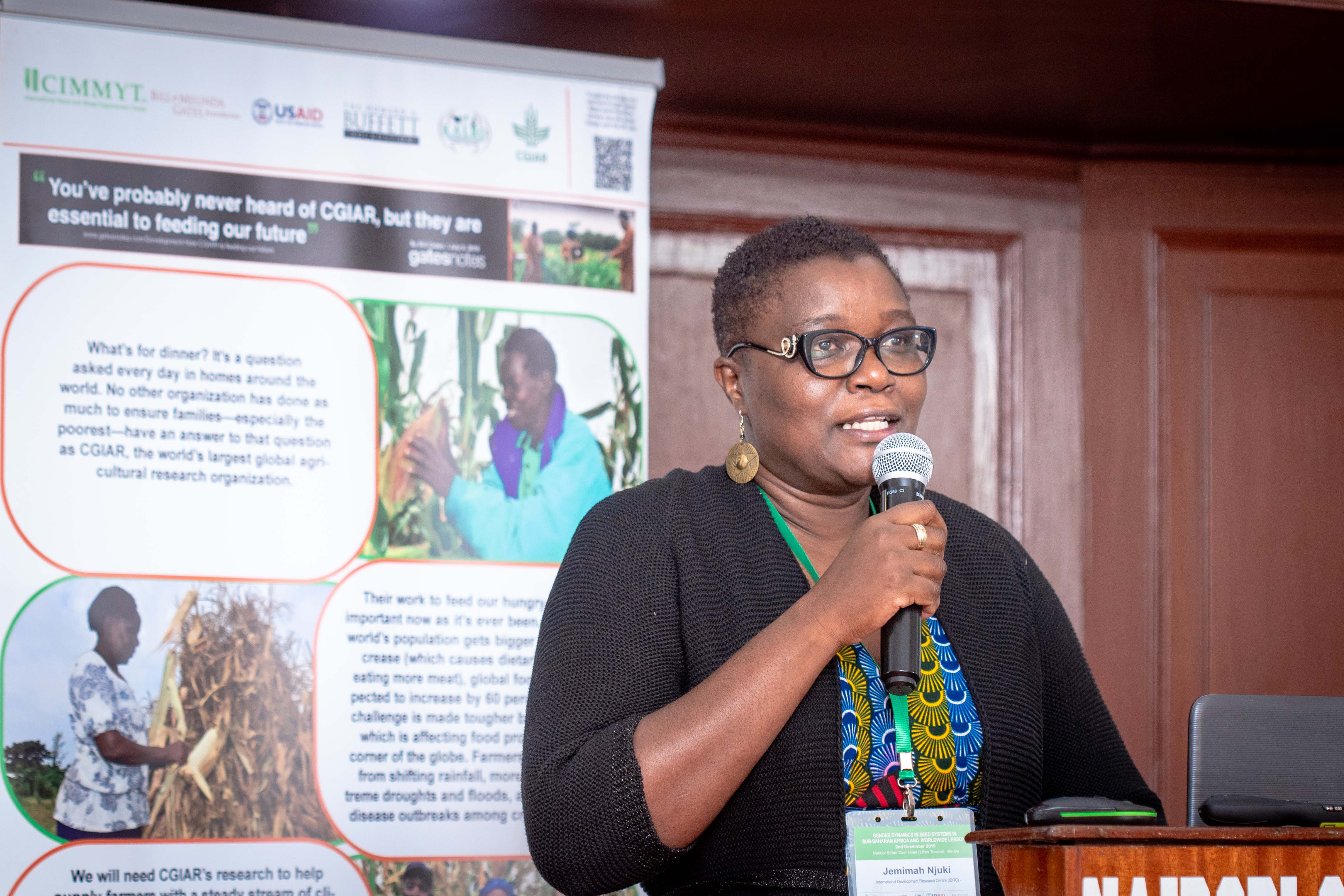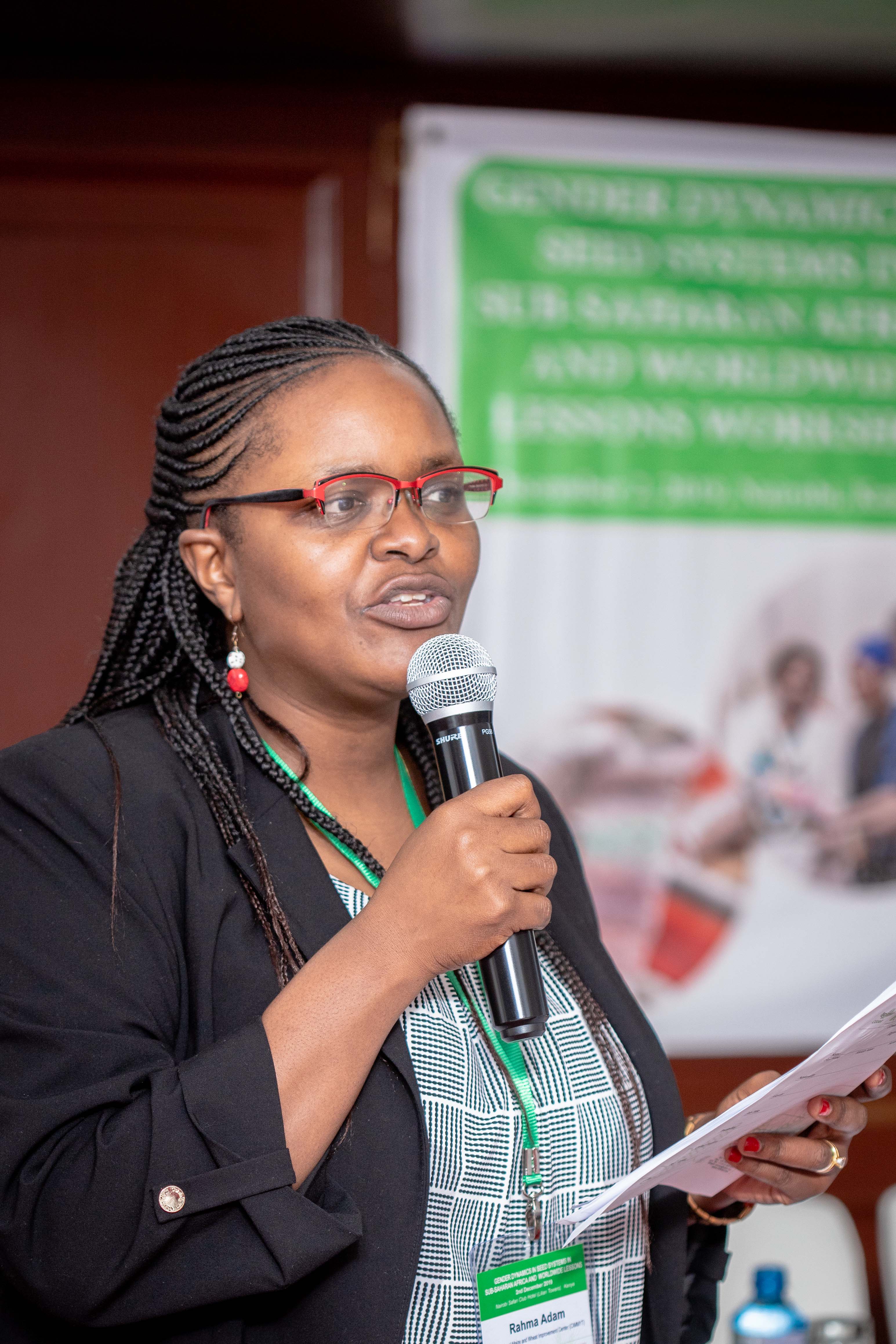January 10, 2020
 Some of the participants at the “Gender dynamics in seed systems in sub-Saharan Africa” workshop held on December 2, 2019, in Nairobi, Kenya. (Photo: Kipenz Films/CIMMYT)
Some of the participants at the “Gender dynamics in seed systems in sub-Saharan Africa” workshop held on December 2, 2019, in Nairobi, Kenya. (Photo: Kipenz Films/CIMMYT)
One important pillar of Africa’s food security is ensuring that quality seeds are developed and delivered to the millions of smallholder farmers that feed the continent. Reaching the last mile with climate-resilient and disease-resistant seeds remains a challenge in many parts of sub-Saharan Africa. “In countries where we invested in seed systems initiatives, we have seen an upsurge in smallholder farm productivity,” said Joseph DeVries, the President of Seed Systems Group. “A story that is not adequately told is that of the important role of women along the seed value chain. In Kenya, 40% of owners of agrodealer shops are women. The farming sector would gain a lot with a stronger role for women in developing a gender-sensitive seed sector,” he noted.
DeVries was one of the keynote speakers at the “Gender dynamics in seed systems in sub-Saharan Africa” workshop organized by the International Maize and Wheat Improvement Center (CIMMYT) on December 2, 2019 in Nairobi, Kenya. The meeting brought together researchers, development practitioners, donors, farmers’ representatives, farmers, seed companies and other private actors.
CIMMYT’s Gender and Development Specialist, Rahma Adam, observed that with the African seed sector being male-dominated, the patriarchal nature of the family and community systems make it harder for women to penetrate the sector easily. For instance, many women employed in the sector mostly dominate the low-paying jobs. Workshop participants agreed that while there are many opportunities for women in the sector, the barriers to entry are many.
 Joseph DeVries, President of Seed Systems Group, addresses participants at the “Gender dynamics in seed systems in sub-Saharan Africa” workshop. (Photo: Kipenz Films/CIMMYT)
Joseph DeVries, President of Seed Systems Group, addresses participants at the “Gender dynamics in seed systems in sub-Saharan Africa” workshop. (Photo: Kipenz Films/CIMMYT)
Acknowledging the gender gap in agriculture
“Decades of gender research have shown that where there is gender inequality, there is food insecurity,” remarked Jemimah Njuki, senior program specialist from the International Development Research Center (IDRC). The gender gap in agricultural productivity observed in sub-Saharan Africa — up to 30% in countries like Nigeria and Malawi — is often explained by unequal access to inputs and male labor for heavy operations such as land preparation, access to knowledge and capital.
Addressing such unequal access is not enough, according to Njuki. To switch to a truly gender-sensitive food system, “you need to address social norms and women’s agency and what they can do on their own.” Taking the example of financial services, women often find difficulties obtaining loans because banks ask for collateral like title deeds, which are typically in the name of the husband or a male in-law. Yet, women are very good at repaying their loans on time. Making finance institutions “womanable” as Njuki put it, would be good for the welfare of women and their family, hence good for business.
 Jemimah Njuki, senior program officer at the International Development Research Center (IDRC), speaks at the workshop. (Photo: Kipenz Films/CIMMYT)
Jemimah Njuki, senior program officer at the International Development Research Center (IDRC), speaks at the workshop. (Photo: Kipenz Films/CIMMYT)
Is there such a thing as seed for women farmers?
Within a household, who has a say in buying new seeds? Do men and women farmers look for the same traits and attributes?
A study conducted in Ethiopia, Kenya, Tanzania and Uganda by Paswel Marenya, a senior agricultural economist at CIMMYT, revealed that in many cases, the man has a greater say in selecting new seed varieties. Other research shows that beyond grain yield, the characteristics of “a good variety” differ between men and women farmers. In the study, both genders mention what they were willing to pay as trade-off against yield. Women would favor a variety with a longer grain shelf-life (ability to store 3-4 months). Men preferred a variety that performs well with low fertilizer requirements. Equally, women farmers engaged in participatory varietal selections tended to provide more nuanced evaluation of varieties than men. Despite this evidence, seed companies do not often adapt their seed marketing strategy according to gender.
Making institutions and seed systems gender-sensitive

CIMMYT’s gender and development specialist Rahma Adam addresses participants at the “Gender dynamics in seed systems in sub-Saharan Africa” workshop. (Photo: Kipenz Films/CIMMYT)
Are there missed opportunities for the seed sector by being “gender-blind”? Rahma Adam believes “the current one-size-fits-all model does not work for many women farmers”. She advises seed companies to be more gender-sensitive when organizing seed marketing operations. Women tend to have less time to attend field demos, the major marketing tool for seed companies. Packaging may not be adapted to suit their more limited purchasing power.
There are good examples of women seed entrepreneurs that have established their niche and reach out to women farmers. Janey Leakey, Director of Leldet Seed Company in Nakuru, Kenya, is one such example. She markets small seed packs called Leldet bouquet, a mix of improved maize and legume seeds at the cost of a cup of tea, to enable women farmers test new varieties.
For the more informal sweet potato seed systems, many women farmers have been successfully engaged in lucrative vine multiplication, thanks to the use of women extensionists and women groups to teach appropriate storage techniques in drought-prone regions. “Such seed business can empower women within the household,” noted Jan Low, co-leader of the Sweetpotato for Profit and Health Initiative (SPHI) at the International Potato Center (CIP) and 2016 World Food Prize Laureate. A woman vine multiplier was able to negotiate with the husband for more land and water access to increase production.
Many other important actors in the public, private and development sectors have also been more deliberate in structuring some of their project or business implementation plans to include or benefit more women in the seed value chain. Among the players are CARE International, Kenya’s Ministry of Agriculture, the Centre for Agriculture and Bioscience International (CABI), the Seed Trade Association of Kenya (STAK), SeedCo, the Agricultural Market Development Trust (AGMARK), World Vision, the Food and Agriculture Organization (FAO), which attended and participated very actively in this workshop.
Some of the plans entail helping more women to access information on climate change to understand their cropping seasons, contracting women farmers as seed out-growers, encouraging and supporting them to join forces to produce seed in group settings. Some of these actors also train women to enhance their entrepreneurial acumen, help them to access finance, obtain the appropriate labor and time-saving machinery, and acquire small seed packs.
Ultimately, designing a seed system that works for men and women requires a holistic approach, from building women’s agency, addressing norms and unequal access to resources. It requires time, dedication, financial and human resources, as well as capabilities and multi-stakeholder collaboration. “The main take-home message is that building a gender-sensitive seed system starts with us,” said Amanda Lanzarone, program officer at the Bill & Melinda Gates Foundation.